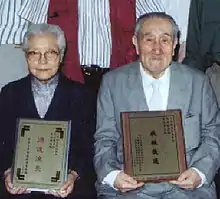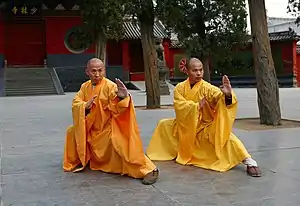Ma Yueliang
Ma Yueliang or Ma Yueh-liang (1 August 1901 – 13 March 1998) was a famous Manchu teacher of tai chi. He was the senior disciple of Wu Jianquan, the founder of Wu-style tai chi, and married Wu's daughter Wu Yinghua in 1930.
| Ma Yueliang 馬岳樑 | |
|---|---|
 His wife Wu Yinghua on the left, and Ma Yueliang on the right | |
| Born | 1 August 1901 China |
| Died | 13 March 1998 (aged 96) |
| Nationality | Chinese |
| Style | Wu-style tai chi, Shaolinquan, Three Emperors Pao Chui, Baguazhang, Tongbeiquan |
| Notable students | Li Liqun Ma Jiangbao Shi Mei Lin |
| Ma Yueliang | |||||||||
|---|---|---|---|---|---|---|---|---|---|
| Traditional Chinese | 馬岳樑 | ||||||||
| Simplified Chinese | 马岳梁 | ||||||||
| |||||||||
| Part of a series on |
| Chinese martial arts (Wushu) |
|---|
 |
Biography
Ma Yueliang was also a medical doctor who graduated from the Beijing Medical College in 1929 with a specialty in hematology. He established the First Medical Examination and Experiment Office and ran the blood clinics at Zhongshan Hospital in Shanghai. Like Wu Quanyou and Wu Jianquan, Ma was of Manchu descent. Ma was educated both in the traditions traditional Chinese medicine and Western science.
There are accounts that Ma was a gifted martial artist in his youth. He had studied a number of martial arts including, Shaolinquan, Three Emperors Pao Chui, Baguazhang and Tongbeiquan. However, Wu Jianquan would accept Ma as a student only if he concentrated on Wu-style tai chi. From about age 18, Ma exclusively studied Wu-style tai chi. Wu Jianquan started the Jianquan Taijiquan Association in Shanghai in 1936, and Ma became the deputy director of the Association. Ma studied tai chi with Wu Jianquan until the death of his teacher in 1942. The Jianquan Association still exists today internationally and remains a resource for the study of Wu-style tai chi.
It is difficult to overstate the importance of Ma Yueliang and his wife in the emergence of Wu-style tai chi after the Cultural Revolution in China. Even at an advanced age, Ma was chosen as one of the 100 Best Martial Artists in China. Wu Yinghua and Ma continued to teach in tai chi until their deaths. They taught a large number of students in Shanghai and in their travels to New Zealand, Germany and elsewhere. They published several books on Wu-style tai chi, including the "Orange Book" relied upon today by Wu-stylists throughout the world.[1] Ma and Wu Yinghua's Wu-style sword/weapons book includes a family picture with several of their closest students. Ma Yueliang also publicly practiced a number of formerly closed door (private or family secret) forms and methods so that they would not be lost. In public, Wu Yinghua would often demonstrate the Wu-style Slow Set and Ma would follow by demonstrating the Wu Style Tai Chi Fast Form. Ma taught many high level students, including Xie Bing Can[2] and Fei Gua-ching, who is still active in the Jianquan Taijiquan Association in Shanghai. Li Liqun is one of Grandmaster Ma's oldest and closest living students. He was the deputy vice-secretary of the Jianquan Association in Shanghai under masters Ma and his wife Wu Yinghua.
Ma Yueliang and Wu Yinghua are survived by their children and grandchildren, including: Ma Jiangchun (b. 1931), Dr. Ma Hailong (b. 1935), Ma Jiangbao, and Ma Jiangling (b. 1947). Ma Jiangbao lived in the Netherlands and taught traditional tai chi throughout Europe. Their adopted daughter Shi Mei Lin now lives and teaches Wu-style tai chi in New Zealand. She also has students in France and in the United States (Tucson, Arizona).
References
- Wu and Ma, 1993
- "Bellevue Tai Chi – Classes with Master Xie Bingcan".
Bibliography
- Wu Kung-tsao. Wu Family T'ai Chi Ch'uan (吳家太極拳) Hong Kong 1980, Toronto 2006, ISBN 0-9780499-0-X
- Wu Yinghua, Ma Yueliang, Shi Mei Lin (1987). Wu Style Tai Chi Fast Form. Henan Science Skills Ltd. Henan (only available in Chinese) ISBN 7-5349-0121-9/G122.
- Wu Yinghua, Ma Yueliang, Shi Mei Lin (1991). Wu Style Tai Chi Fast Form. Shanghai Book Co Ltd, Hong Kong (only available in Chinese) . ISBN 962-239-106-0.
- Wu Yinghua, Ma Yueliang (1993). Wu Style Tai Chi Chuan Forms, Concepts and Application of the Original Style. Shanghai Book Co Ltd, Hong Kong. ISBN 962-239-103-6.
- Ma Yueliang & Zee Wen (1986, 1990, 1995). Wu Style Tai Chi Chuan Push Hands. Shanghai Book Co Ltd, Hong Kong. ISBN 962-239-100-1.
- Dr Zee Wen (2002) Wu Style Tai Chi Chuan, Ancient Chinese way to health. North Atlantic Books. ISBN 978-1-55643-389-4.
Tai chi lineage tree with Wu-style focus
Note:
- This lineage tree is not comprehensive, but depicts those considered the 'gate-keepers' & most recognized individuals in each generation of Wu-style.
- Although many styles were passed down to respective descendants of the same family, the lineage focused on is that of the Wu style & not necessarily that of the family.
| Key: | NEIJIA | ||||||||||||||||||||||||||||||||||||||||||||||||||||||||||||||||||||||||||||
| Solid lines | Direct teacher-student. | ||||||||||||||||||||||||||||||||||||||||||||||||||||||||||||||||||||||||||||
| Dot lines | Partial influence /taught informally /limited time. | TAI CHI | |||||||||||||||||||||||||||||||||||||||||||||||||||||||||||||||||||||||||||
| Dash lines | Individual(s) omitted. | ||||||||||||||||||||||||||||||||||||||||||||||||||||||||||||||||||||||||||||
| Dash cross | Branch continues. | CHEN-STYLE | Zhaobao-style | ||||||||||||||||||||||||||||||||||||||||||||||||||||||||||||||||||||||||||
| YANG-STYLE | |||||||||||||||||||||||||||||||||||||||||||||||||||||||||||||||||||||||||||||
| (王蘭亭) Wang Lanting 1840–? 2nd gen. Yang | Yang Jianhou 1839–1917 2nd gen. Yang 2nd gen. Yangjia Michuan | Yang Banhou 1837–1892 2nd gen. Yang 2nd gen. Guang Ping Yang Yang Small Frame | WU (HAO)-STYLE | Zhaobao He-style | |||||||||||||||||||||||||||||||||||||||||||||||||||||||||||||||||||||||||
| Li-style | Yang Shao-hou 1862–1930 3rd gen. Yang Yang Small Frame | Wu Quanyou 1834–1902 1st gen. Wu | |||||||||||||||||||||||||||||||||||||||||||||||||||||||||||||||||||||||||||
| (齊閣臣) Qi Gechen 2nd gen. Wu | (夏公甫) Xia Gongfu 2nd gen. Wu | Wu Jianquan 1870–1942 2nd gen. Wu WU-STYLE 108 Form | (常遠亭) Chang Yuanting 1860–1918 2nd gen. Wu | (郭松亭) Guo Songting 2nd gen. Wu | Wang Maozhai 1862–1940 2nd gen. Wu | SUN-STYLE | |||||||||||||||||||||||||||||||||||||||||||||||||||||||||||||||||||||||
| Dong Yingjie 1891–1960 4th gen. Yang | (齊敏軒) Qi Minxuan 3rd gen. Wu | Cheng Wing Kwong 1903–1967 3rd gen. Wu | Wu Yinghua 1907–1997 3rd gen. Wu | Wu Gongyi 1900–1970 3rd gen. Wu | Wu Kung-tsao 1903–1983 3rd gen. Wu | Ma Yueliang 1901–1998 3rd gen. Wu | Yang Yuting 1887–1982 3rd gen. Wu | ||||||||||||||||||||||||||||||||||||||||||||||||||||||||||||||||||||||
| (鄭天熊) Cheng Tin Hung 1930–2005 Wudang-style | Wu Ta-k'uei 1923–1972 4th gen. Wu | Wu Yanxia 1930–2001 4th gen. Wu | Wu Daxin 1933–2005 4th gen. Wu | (立群) Li Liqun 1924–2013 4th gen. Wu | Wang Peisheng 1919–2004 4th gen. Wu | ||||||||||||||||||||||||||||||||||||||||||||||||||||||||||||||||||||||||
| Wu Kuang-yu 1946–Present 5th gen. Wu | (骆舒焕) Luo Shuhuan 1935–1987 5th gen. Wu | ||||||||||||||||||||||||||||||||||||||||||||||||||||||||||||||||||||||||||||
| CHEN-STYLE | YANG-STYLE | WU-STYLE | SUN-STYLE | WU (HAO)-STYLE | |||||||||||||||||||||||||||||||||||||||||||||||||||||||||||||||||||||||||
External links
- Google video of Ma Yueliang performing Wu-style fast form
- QuickTime movie of Ma Yueliang performing 13 posture spear form
- Video of Ma Yueliang Taiji sword form on YouTube
- Ma Yueliang pushing hands, Shanghai on YouTube
- Ma Yueliang pushing hands Yong Nian Taiji Festival on YouTube
- Ma Yueliang Pushing hands, New Zealand 1990 on YouTube
- Interview with Ma Yueliang on YouTube by Bill Moyers
- Wu Yinghua and Ma Yueliang interview in New Zealand 1990 on YouTube
- Wu Yinghua and Ma Yueliang on YouTube
- A Tribute to Ma Yueliang on YouTube
- Ma Jiangbao's Traditional Wu-style Taijiquan website
- Wu-style Taijiquan website: Shanghai